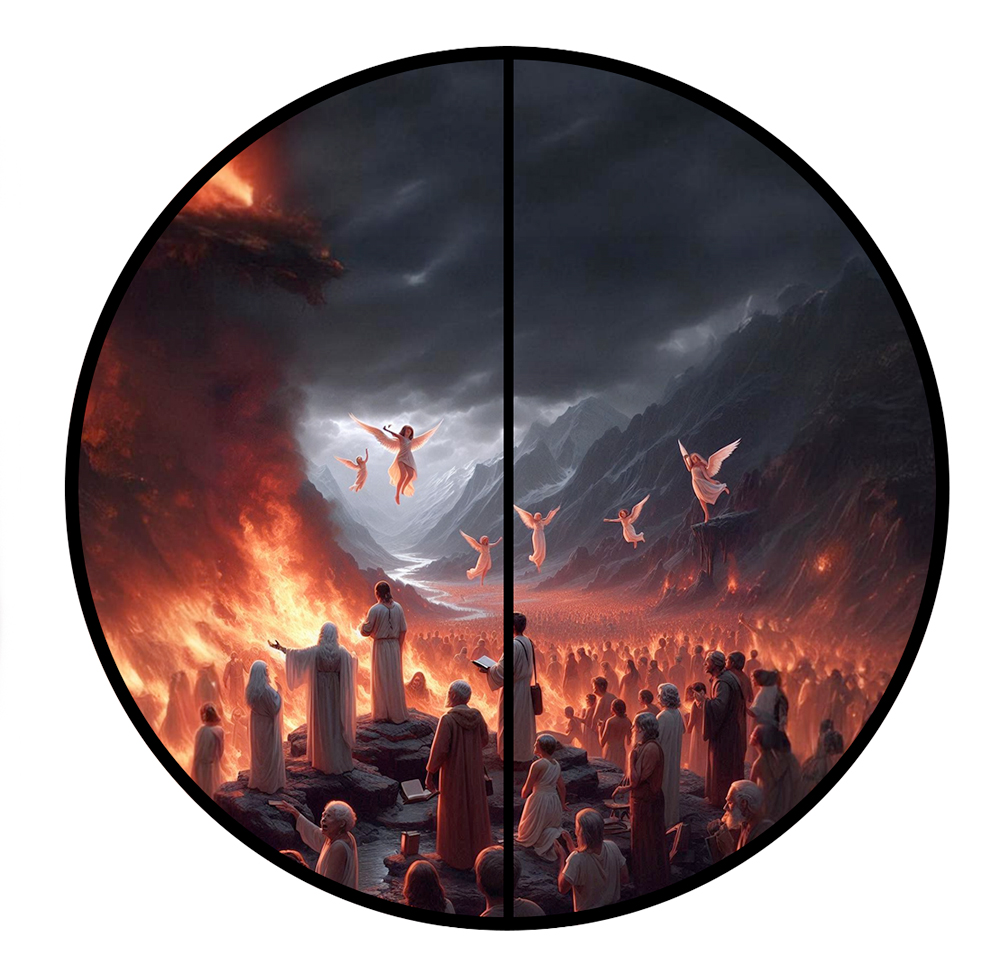 Matthew 5:22
Matthew 5:22

|
Strongs 1473
[list] Λογεῖον Perseus egō ἐγὼ myself PPro-N1S |
|
Strongs 1161
[list] Λογεῖον Perseus de δὲ and Conj |
|
Strongs 3004
[list] Λογεῖον Perseus legō λέγω I am saying V-PIA-1S |
|
Strongs 4771
[list] Λογεῖον Perseus hymin ὑμῖν to yourselves PPro-D2P |
|
Strongs 3754
[list] Λογεῖον Perseus hoti ὅτι because/that Conj |
|
Strongs 3956
[list] Λογεῖον Perseus pas πᾶς all Adj-NMS |
|
Strongs 3588
[list] Λογεῖον Perseus ho ὁ the Art-NMS |
|
Strongs 3710
[list] Λογεῖον Perseus orgizomenos ὀργιζόμενος he who is being angry with V-PPM/P-NMS |
|
Strongs 3588
[list] Λογεῖον Perseus tō τῷ the Art-DMS |
|
Strongs 80
[list] Λογεῖον Perseus adelphō ἀδελφῷ brother N-DMS |
|
Strongs 846
[list] Λογεῖον Perseus autou αὐτοῦ himself PPro-GM3S |
|
Strongs 1777
[list] Λογεῖον Perseus enochos ἔνοχος guilty Adj-NMS |
|
Strongs 1510
[list] Λογεῖον Perseus estai ἔσται will be V-FIM-3S |
|
Strongs 3588
[list] Λογεῖον Perseus tē τῇ the Art-DFS |
|
Strongs 2920
[list] Λογεῖον Perseus krisei κρίσει separation N-DFS |
|
Strongs 3739
[list] Λογεῖον Perseus hos ὃς which/whichever RelPro-NMS |
|
Strongs 1161
[list] Λογεῖον Perseus d’ δ’ now Conj |
|
Strongs 302
[list] Λογεῖον Perseus an ἂν conditional particle Prtcl |
|
Strongs 2036
[list] Λογεῖον Perseus eipē εἴπῃ should say V-ASA-3S |
|
Strongs 3588
[list] Λογεῖον Perseus tō τῷ the Art-DMS |
|
Strongs 80
[list] Λογεῖον Perseus adelphō ἀδελφῷ brother N-DMS |
|
Strongs 846
[list] Λογεῖον Perseus autou αὐτοῦ himself PPro-GM3S |
|
Strongs 4469
[list] Λογεῖον Perseus Rhaka Ῥακά Raca N-VMS |
|
Strongs 1777
[list] Λογεῖον Perseus enochos ἔνοχος guilty Adj-NMS |
|
Strongs 1510
[list] Λογεῖον Perseus estai ἔσται will be V-FIM-3S |
|
Strongs 3588
[list] Λογεῖον Perseus tō τῷ the Art-DNS |
|
Strongs 4892
[list] Λογεῖον Perseus synedriō συνεδρίῳ Council N-DNS |
|
Strongs 3739
[list] Λογεῖον Perseus hos ὃς which/whichever RelPro-NMS |
|
Strongs 1161
[list] Λογεῖον Perseus d’ δ’ now Conj |
|
Strongs 302
[list] Λογεῖον Perseus an ἂν conditional particle Prtcl |
|
Strongs 2036
[list] Λογεῖον Perseus eipē εἴπῃ should say V-ASA-3S |
|
Strongs 3474
[list] Λογεῖον Perseus Mōre Μωρέ Fool Adj-VMS |
|
Strongs 1777
[list] Λογεῖον Perseus enochos ἔνοχος guilty Adj-NMS |
|
Strongs 1510
[list] Λογεῖον Perseus estai ἔσται will be V-FIM-3S |
|
Strongs 1519
[list] Λογεῖον Perseus eis εἰς into Prep |
|
Strongs 3588
[list] Λογεῖον Perseus tēn τὴν the Art-AFS |
|
Strongs 1067
[list] Λογεῖον Perseus geennan γέενναν Valley of Hell N-AFS |
|
Strongs 3588
[list] Λογεῖον Perseus tou τοῦ the Art-GNS |
|
Strongs 4442
[list] Λογεῖον Perseus pyros πυρός of fire N-GNS |
Valley of Hell: Child Sacrifice
And I, myself, am saying to yourselves, that anyone who is being angry with the Brother of himself will be bound to the Separation, and whoever should say to the Brother himself, 'Empty/Void' ("Rhaka") will be bound to the Sitting-Council, and whoever should say 'Teacher' ("Moreh") will be bound into the Valley of Hell ("Gehenna") of the Fire.12
"Rabbi, Teacher!"
But I say to you, That every one becoming angry with his brother, shall be subject to judgment: and whoever should say to his brother, Raca, should be, subject to the council: and whoever should say, O foolish, shall be subject to a hell of fire.
But I say to you, Everyone who is angry with his brother without a cause shall be liable to the Judgment. And whoever says to his brother, Raca, shall be liable to the sanhedrin; but whoever says, Fool! shall be liable to be thrown into the fire of Hell.
But I say to you that everyone who is angry with his brother will be liable to judgment; whoever insults his brother will be liable to the council; and whoever says, ‘You fool!’ will be liable to the hell of fire.
Footnotes
| 12 | Strongs #G1067. γέεννα, gehenna. "Gehenna" originates from the Hebrew גי בן־הנם (Gê Ben-Hinnom), which translates to "Valley of the Son of Hinnom." Numerous traditions were developed out of this word. Child Sacrifice:
Fool? The Greek word Μωρέ Mōre. As a Greek word, being the root of "moron" and meaning "dull" or "sluggish" doesn't make sense contextually. Notwithstanding, the previous warning of using the word "Raca" is not based on a Greek word, but is a transliteration of Aramaic. Thus it logically follows that "mōre" would be a transliteration of Hebrew. Strongs #4175 moreh מוֹרֶה, teacher, instructor. This is the primary meaning of "מוֹרה" in Hebrew. It refers to someone who teaches or instructs others. In the Old Testament, it is often used to denote a teacher or instructor of various subjects, including religious teachings (See Genesis 12:6, Isaiah 30:20). There has already been debate/discussion of the word moreh as a transliteration. The commentary from Pulpit Commentary for example:
As the most pure transliteration of a Hebrew word, moreh simply means "Teacher." The question is then, what is the context? Surely it must mean "fool"? And thus we must be extra careful about ever calling someone a fool? "But yourselves should not be summoned as 'My Abounding One (Rabbi),' for one is, of yourselves, the Teacher, and everyone of yourselves are brothers." (Jesus, Matthew 23:8 RBT) "Fools! ("μωροὶ moroi")" (Jesus, Matthew 23:17) By the traditional interpretation of the scholars, Jesus effectively eats his own words, making himself liable to the hell fire of Gehenna. |